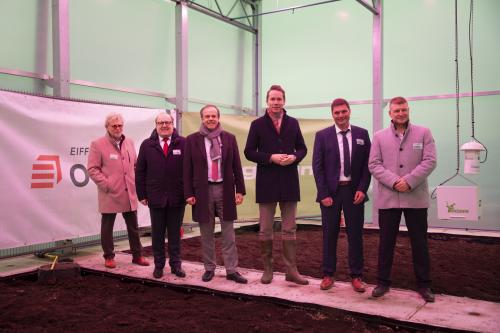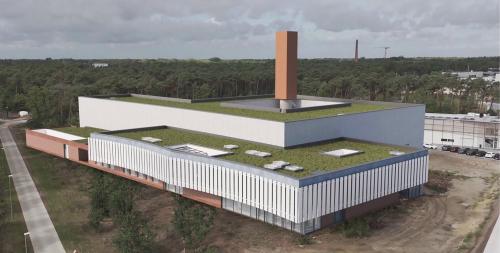First of its kind: C-biotech and Trafiroad install Belgium’s first circular and CO₂-negative traffic bollard in Lokeren
Locally produced with local raw materials
The CO₂-negative diamond-top bollard, which was ceremoniously installed near Lokeren’s city hall in the presence of the press, is made of recycled plastic, household waste, and industrial hemp. Developed by Trafiroad and C-biotech and produced by Anziplast, the bollard is innovative in both its composition and its production process and environmental impact. By using locally available raw materials and working with Belgian production partners, this project demonstrates that sustainability and economic viability can go hand in hand.
“Creating products from raw materials we already possess should become the new standard,” says Tony Marien, COO of Trafiroad. “These products are often more sustainable than imported alternatives. By producing locally at a competitive price point, we not only stimulate employment and entrepreneurship, but also reduce our dependence on foreign suppliers. Our diamond-top bollard is the start of what future-proof products should look like: local, sustainable, and economically feasible.”
Streamlined production process with nine partners
The CO₂-negative diamond-top bollard is the result of a meticulous and transparent collaboration. To realize its vision of using bio-composite for this application, C-biotech brought together no fewer than eight other parties: in addition to Trafiroad and the City of Lokeren, Anziplast, UBQ Materials, SGS, delaware, and Microsoft were all involved.
“And that’s absolutely necessary,” says Frederik Verstraete, CEO of C-biotech. “To build a new economy, you need many strong shoulders. We chose partners with international expertise in their field to create a robust product that is both scalable and credible.”
Circular and CO₂-negative
At UBQ Materials’ 55,000 m² factory in Bergen op Zoom, household waste is collected and combined by Trafiroad and C-biotech with recycled plastic (HDPE) and locally grown hemp to develop an innovative bio-composite — and that’s good news for the planet. Hemp is a CO₂-negative raw material that reduces soil erosion and offers an alternative to tropical hardwood, which is increasingly scarce and expensive. At Anziplast’s state-of-the-art facility in Izegem, this bio-composite is molded into traffic bollards using energy-efficient injection molding machines. Trafiroad then handles distribution to cities and municipalities across Northern Europe.
“As the market leader in signage, we are proud to be the first to launch a 100% circular and CO₂-negative diamond-top bollard,” adds Tony Marien. “In addition to preventing deforestation and giving waste materials a second life, our bollard provides effective visual warning and reduces damage in the event of vehicle impact. This is just the beginning — we aim to expand this approach to a full range of traffic and street furniture products aligned with our commitment to a sustainable future.”
“By recovering household waste destined for landfills or incineration and converting it into high-quality construction products — without compromising on quality or price — we’re offering a scalable circular model with immediate impact on decarbonizing the construction industry. "It shows that here in Europe, we have the tools, the technology, and the urgency to lead the way toward a climate-positive future — not tomorrow, but starting today,” says Albert Douer, CEO of UBQ Materials.
Full traceability
To prove the sustainability of the final product, full traceability of the entire production process is essential. For this technological challenge, Cordeel Group turned to Microsoft, which used its expertise in data processing and blockchain technology to build a fully transparent system. Every step of the process is logged in a digital chain — from the hemp field to the final product. With the support of satellite data and sensors on the machines involved, it is possible to monitor and calculate the CO₂ impact of each phase. As a result, C-biotech can scientifically demonstrate exactly how much CO₂ is stored in the finished product.
Delaware, one of Belgium’s leading IT service providers, also plays a key role: they built a platform for Earth+ to scientifically visualize and connect the entire chain in real time, ensuring complete traceability throughout the process.
SGS, a globally recognized leader in inspection, verification, and certification, is responsible for the independent validation of C-biotech’s sustainability claims. SGS certifies bio-based and recycled products using scientifically validated methods in accordance with established international standards. A certification roadmap was drawn up in close collaboration, and C-biotech intends to complete the certification process in the near future. Thanks to this partnership, C-biotech’s claims can be verified using evidence-based methodologies — with SGS bringing decades of experience to the table.
Rooted in Lokeren
t is no coincidence that the first diamond-top bollard was installed in Lokeren. C-biotech, its CEO Frederik Verstraete, and Trafiroad are all deeply rooted in this city in the Waasland region. For years, Lokeren has embraced and encouraged a growing trend of innovation in the circular economy. There is also strong belief that the production and sale of this new bollard will have a major impact on reducing CO₂ emissions.
“As a city, we are of course proud to be able to count on local entrepreneurs to help contribute to the ambitious climate goals we are all working toward,” says Peter De Bock, Alderman for Sustainability and Climate.
“This innovative partnership, by and for the people of Lokeren, makes us incredibly proud to introduce and launch the first CO₂-reducing diamond-top bollard on our territory. We wish the partners every success with the further rollout of their product and thank them for the positive impact they are creating — and striving to create — for our climate,” adds Sarah Poppe, Alderman for Economy.









